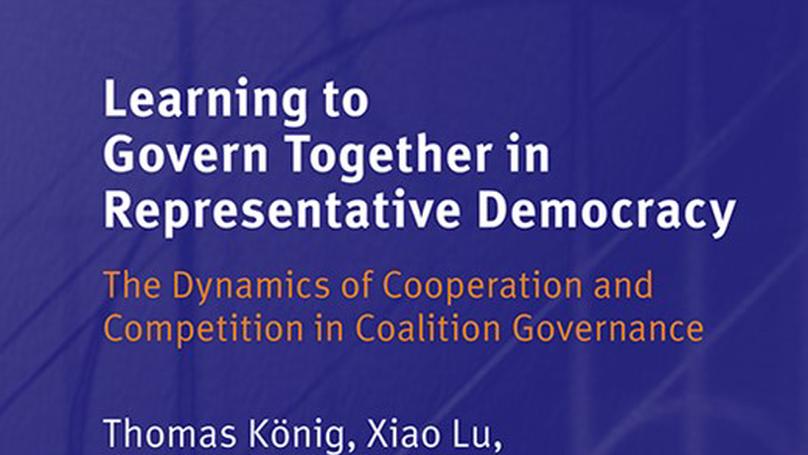Biography
I am an Assistant Professor at Peking University.
My research develops theoretical and statistical models to analyze heterogeneous and dynamic political processes across contexts, with a focus on party competition, legislative decision-making, and political representation and accountability in coalition governance in Europe.
My work has appeared or is forthcoming in American Political Science Review, Political Analysis, European Journal of Political Research, Political Science Research and Methods, Journal of Theoretical Politics, and Political Science Quarterly, among others. My books are published or forthcoming with Cambridge University Press and Oxford University Press.
I hold a Ph.D. from the University of Mannheim.
Selected Publications

Learning to Govern Together in Representative Democracy introduces a dynamic theory of coalition governance, focusing on the temporal constraints that coalition parties face when governing together in representative democracies. The book examines how coalition partners, over the course of a legislative term, adapt their strategies for joint policy-making as they encounter varying levels of cooperation and competition in partnership. Two distinct models of learning are developed, namely the portfolio-learning model, where ministers learn through interactions within their portfolios, and the partisan-learning model, which accounts for learning from co-partisan experiences across portfolios. Empirical evidence from 11 parliamentary democracies demonstrates that ministerial office-holders infer the type of partnership from their experienced parliamentary scrutiny, with consequences for their legislative behavior, such as initiating government bill proposals earlier in the term if they perceive a cooperative partnership, or later in the term if they perceive a competitive partnership. The book makes a significant contribution to our understanding of coalition effectiveness, stability, and satisfaction with governance.
Projects
- 2022-2024 BA Leverhulme Small Grant, Quality of Legislation as a Strategic Component in Legislative Decision-making (with Moritz Osnabrügge and Matia Vannoni). Grant amount: £9,970.
Invited Talks & Conference Presentations
Paper Presentation
Analyzing Heterogeneous Timing Strategies in Legislative Agenda-Setting. APSA Annual Meeting, 2025.
Measuring Quality of Legislation Using Natural Language Processing. 14th Annual Conference of the European Political Science Association, 2024.
Strategic Timing in Coalition Policymaking. APSA Annual Meeting, 2024.
Conditional Timing in Coalition Policymaking. ECPR General Conference, 2023.
Analyzing Political Cycles as Heterogeneous Circular Data of Timing. PolMeth Europe, 2022.
Legislative Decision Making and Law Compliance in the EU. 79th Annual MPSA Conference, 2022.
Beyond the Average: Empirical Hypothesis Testing with Heterogeneous Effects across the Distribution of the Outcomes. 78th Annual MPSA Conference, 2021.
Helping or Sanctioning? Heterogeneous Effects in the Strategic Analysis of International Compliance. 11th Annual Conference of the European Political Science Association, 2021.
How to Identify Dr. Jekyll and Mr. Hyde in Strategic Sequential Choices? Player Heterogeneity and Quantile Models. PolMeth Europe, 2021.
Beyond the Average: Hypothesis Testing with Quantile Mixture”. ECPR General Conference, 2020, Innsbruck, Austria.
Should I Stay or Should I Go? The British Membership Game between Prime Ministers, the Rank-and-File, and the Voters . EPSA Annual conference, 2020, Prague, Czech.
Divided Parties, Heterogeneous Voters and Electoral Choice (with Felix Olsowski). 77th Annual MPSA Conference, 2019, Chicago, USA.
Discrete Choice Data with Unobserved Heterogeneity: A Conditional Binary Quantile Model. 77th Annual MPSA Conference, 2019, Chicago, USA.
Player Heterogeneity and Equilibrium Multiplicity: Local Identification Using a Bayesian Strategic Quantile Model. Joint Annual Conference of the GPSA Methods of Political Science Section and the SPSA Empirical Methodology Working Group, 2019, Basel, Switzerland.
Poster Presentation
- Discrete Choice Data with Unobserved Heterogeneity: A Conditional Binary Quantile Model. 6th Asian Political Methodology Meeting and Annual Meeting of the Japanese Society for Quantitative Political Science, 2019, Kyoto, Japan.
Manuscript Referee Service
American Political Science Review
American Journal of Political Science
Political Analysis
European Union Politics
Statistical Modelling
Teaching
“Quantitative Methods in International Relations”, University of Mannheim
“Introduction to International Relations: Competing Parties and International Outcomes”, University of Mannheim
“Introduction to European Union Politics”, Peking University
“Comparative Politics”, Peking University